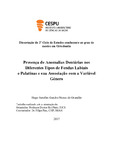Presença de anomalias dentárias nos diferentes tipos de fendas labiais e palatinas e sua associação com a variável género
Fecha
2018Autor
Grandão, Hugo Serafim Gandra Nunes de
Metadatos
Mostrar el registro completo del ítemResumen
Objetivo: o objetivo do estudo foi investigar a prevalência das anomalias dentárias associadas ao gênero (masculino ou feminino) num grupo de indivíduos com fenda labial e/ou palatina (FL/P) numa consulta multidisciplinar de um Hospital Geral no norte do país, Portugal, entre 2016 e 2017.
Pacientes: Ortopantomografia e ficheiros clínicos de 53 indivíduos, 18 gênero feminino (29%) e 35 género masculino (71%)) com FL/P sem síndromes foram selecionados no programa SClinic, com idade compreendida entre 8 a 17 anos.
Resultados: Observou-se que na amostra de 53 indivíduos a fenda mais prevalente é a Transforâmen com 71,7% do total, seguido da Fenda Pós-forâmen com 17% e Pré-forâmen com 11,3%. Relativamente à frequência de fendas por género, observou-se uma maior incidência de fendas, na fenda Transforâmen unilateral esquerda no género masculino com 20,8% e no género feminino com 11,3% do total.
As anomalias dentárias com maior prevalência são as agenesias em 86,8%, com 46 indivíduos do género masculino (54,7%) e 17 do género feminino (32,1%). Verifica-se que o lado com mais agenesias é o superior (lado direito), representando 46% da ocorrência das hipodontias. Neste, salienta-se que 57% dos indivíduos com agenesia, não possuem o Incisivo lateral superior direito, seguido de 43% dos indivíduos com agenesia do Segundo pré-molar superior direito. Verifica-se, também, que a agenesia mais elevada da amostra, com 65% dos indivíduos é a agenesia do dente - Incisivo lateral superior esquerdo.
A percentagem de indivíduos com retenção dos caninos é de 71,7% para (ambos) os dentes (13 e 23).
Neste estudo, o termo "dentes atípicos" correspondem a microdontia, supranumerário, anomalias de forma e transposição, correspondentes a 50,9% da população estudada com prevalência no género masculino de 37,7% e 13,2% do género feminino.
Conclusões: A maior prevalência FL/P é a Transforâmen no sexo masculino.
A anomalia dentária nas FL/P mais prevalente são as agenesias comparativamente a todas as anomalias dentárias estudadas. Com a maior frequência dos incisivos laterais direito e esquerdo, seguido do dente pré-molar superior direito. Objective: The objective of our study was to investigate the prevalence of dental anomalies associated with gender (male or female) in a group of individuals with cleft lip and/or palate (CLP), in a multidisciplinary appointment in a General Hospital, in the north of the country, Portugal, between 2016 and 2017.
Patients: Orthopantomography and clinical files of 53 individuals, 18 female gender (29%) and 35 male gender (71%) with CLP without syndromes were selected in the SClinic program, with ages between 8 and 17 years.
Results: We observed that in the sample of the 53 individuals, the most prevalent cleft is the Transforamen with 71.7% of total, followed by the Post-Foramen cleft with 17% and Pre-Foramen with 11.3%. Regarding gender, a greater incidence of clefts was observed in the Transforâmen unilateral left, in the male gender with 20.8% and in the female gender with 11.3% of total.
The most prevalent dental anomalies is the teeth agenesis, observed in 86.8% of the individuals, with 46 men (54.7%) and 17 women (32.1%). We observed, that the jaw side with more agenesis is the upper (right side), representing 46% of the occurrence of hypodontias. From this, 57% of individuals with agenesis don´t have the right upper lateral incisor, followed by 43% of individuals with agenesis of the second right upper premolar. We also concluded, that the highest teeth agenesis, is the agenesis of the – left upper lateral incisor, with 65% of the individuals.
The percentage of individuals with canine retention is 71.7% for (both) teeth (13 and 23).
In this study, the term "atypical teeth" corresponds to microdontia, supernumerary, anomalies of form and transposition, corresponding to 50.9% of the studied population with prevalence in the male gender of 37.7% and 13.2% of the female gender.
Conclusions: The highest CLP prevalence is Transforamen in males.
The most predominant CLP dental anomaly is the agenesis, compared to all dental anomalies studied. With the highest frequency of the right and left lateral incisors, followed by the right upper premolar tooth.

